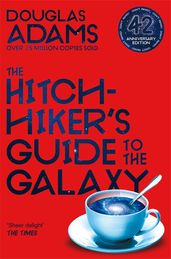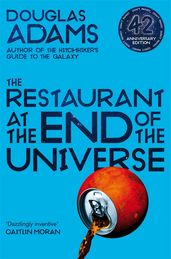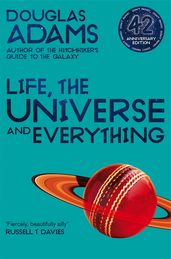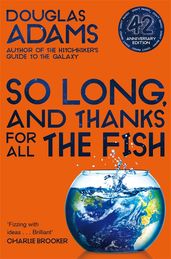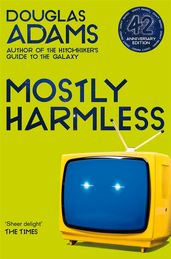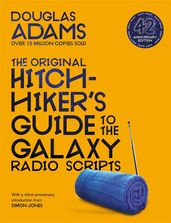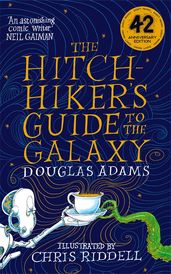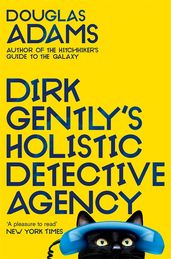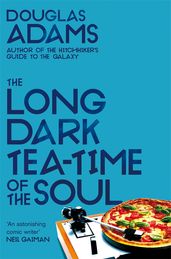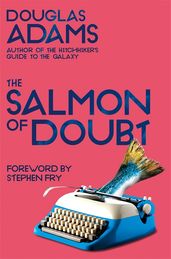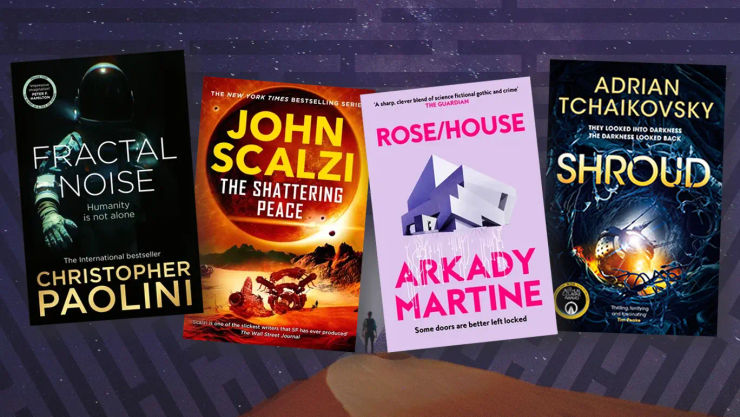The Hitchhiker’s Guide to the Galaxy books: a complete guide
Don't panic! Jean Menzies has everything you need to know about Douglas Adams’ intergalactic Hitchhiker’s Guide to the Galaxy science fiction series, including each of The Hitchhiker’s Guide to the Galaxy books in order and what to read next.
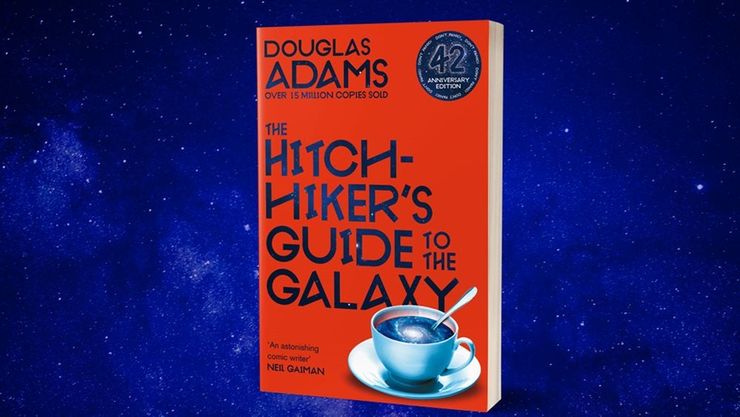
The Hitchhiker's Guide to the Galaxy books were first published in October 1979. First, the adventures of Arthur Dent, Ford Prefect and Marvin the Paranoid Android were transmitted over the airwaves, and then came Douglas Adams' five science fiction books set in the Hitchhiker’s universe, which have inspired stage plays, TV shows and film adaptations, as well as an annual day of celebration every 25 May. If you're not already up to speed, superfan Jean Menzies has everything you need to know about The Hitchhiker’s Guide to the Galaxy books.
How many books are there in The Hitchhiker’s Guide to the Galaxy series?
There are five books in The Hitchhiker's Guide to the Galaxy series.
After the radio show was originally broadcast in 1978, Douglas Adams adapted the story to novel format the following year. One book is never enough, not with this amount of imagination, however, and he continued to expand on The Hitchhiker’s Guide to the Galaxy universe over the course of four successive novels.
All five books are available individually or bound up in what Douglas Adams dubbed his ‘trilogy in five’ (just go with it).
In addition to The Hitchhiker’s Guide to the Galaxy novels you can also read the original radio script itself; keep an eye out for small differences between the radio show and the books because there are a few . . .
The Hitchhiker’s Guide to the Galaxy books in order
The Hitchhiker's Guide to the Galaxy
by Douglas Adams
Arthur Dent is whisked into space by his best friend Ford Prefect – who turns out to be an alien hitchhiker. Together they join the crew of the spaceship Heart of Gold and set off to explore the universe.
The Restaurant at the End of the Universe
by Douglas Adams
While you’re exploring outer space, why not make the most of it and stop by the famous Restaurant at the End of the Universe? Arthur Dent certainly plans to. It’s just a shame there is a crew of angry Vogons trying to hunt down Arthur and his friends before dinner.
Life, the Universe and Everything
by Douglas Adams
Arthur has travelled to the most distance recesses of space, yet somehow he never expected to also travel in time. Now he’s stranded on a prehistoric version of Earth, surely things can’t get any worse?
So Long, and Thanks for All the Fish
by Douglas Adams
With the mystery of 42 finally solved you might think it’s time to take a nap but that’s not the case for Arthur and co. When Arthur meets Fenchurch, the girl of his dreams, he gets dragged into a mission to figure out how exactly the world can be made a happy place. Just your casual Sunday afternoon.
Mostly Harmless
by Douglas Adams
When all else fails, find a nice new planet and settle down – at least that’s what Arthur Dent has planned. But as we all know by now, nothing is that straightforward for our hapless human wanderer, and that nice quiet life goes out the window when his daughter turns up out of the blue.
And if all of that weren’t enough, author Eoin Colfer contributed a sixth and final instalment to the series based on unpublished material from Douglas Adams himself, aptly entitled And Another Thing…
The Original Hitchhiker's Guide to the Galaxy Radio Scripts
by Douglas Adams
This collection is a faithful reproduction of the text which was published in 1985, featuring all twelve original radio scripts as they were broadcast for the very first time. This is a must-have piece of memorabilia for all Douglas Adams fans.
Who narrates the audiobooks for The Hitchhikers Guide to the Galaxy?
Of course, you could also try listening to the stories instead. Either pick up the original radio show or check out the audiobooks narrated by Stephen Fry and, later, Martin Freeman (both of whom you might recognise from the 2005 film adaptation). You can find the audiobook version of book one here.
What does the 42 mean in The Hitchhikers Guide to the Galaxy?
2021 marked 42 years since The Hitchhiker’s Guide to the Galaxy books were published. So what? 42 years, you ask, what kind of anniversary is that? Well, allow me to tell you why this is the only anniversary that matters.
In 1978 comic genius Douglas Adams wrote the script for a new radio show. The story followed Arthur Dent, a perfectly ordinary human man whose best friend Ford Prefect is, unbeknownst to him, an alien. It’s a good thing they are friends though, because as Arthur soon finds out the earth is in the way of a hyperspace bypass and a fleet of Vogon spaceships is about to demolish the inconvenient planet. (If only humanity had paid a visit to the local galactic planning office, they might have had more warning.)
Arthur, however, is saved from certain death when Ford sticks out his thumb and hitches them a ride on the very ships about to destroy the Earth. Dragged into outer space by an intergalactic hitchhiker, Arthur is about to be faced with despondent robots, ear-splitting alien poetry and, perhaps most surprisingly of all, the woman who he had been kicking himself for not asking on a date at a party six months earlier. And during the course of their riotous adventures Arthur and co will learn the answer to the ultimate question of life, the universe, and everything: 42.
This gorgeous 42nd anniversary gift edition of The Hitchhiker's Guide to the Galaxy is stunningly illustrated throughout by Costa Award-winner Chris Riddell.
The Hitchhiker's Guide to the Galaxy Illustrated Edition
by Douglas Adams Illustrated by Chris Riddell
It's an ordinary Thursday lunchtime for Arthur Dent until his house gets demolished. The Earth follows shortly afterwards to make way for a new hyperspace express route, and Arthur's best friend has just announced that he's an alien. At this moment, they're hurtling through space with nothing but their towels and a book inscribed in large, friendly letters: DON'T PANIC.
Is there a The Hitchhiker’s Guide to the Galaxy film?
Over the years, the humour and creativity of Douglas Adams’ writing has garnered fans from every generation. This world-wide popularity has also inspired numerous adaptations of the stories that seep into every medium. The Hitchhiker’s Guide to the Galaxy has been adapted into stage plays, TV series and a film.
In the immediate aftermath of the radio programme, various companies produced plays based on Arthur Dent’s adventures. Between 1979 and 1980 the Institute of Contemporary Arts, Theatr Clwyd, and Rainbow Theatre all put their hand to adapting The Hitchhiker’s Guide the Galaxy for stage, while in 1981 a six-episode television series was produced for BBC Two. It featured many of the same actors who had voiced the original radio show, including Simon Jones as Arthur Dent.
Hitchhiker’s went from the small screen to big screen in 2005, which saw the first feature film adaptation of The Hitchhiker's Guide to the Galaxy with Martin Freeman taking on the role of Arthur Dent. Douglas Adams co-wrote the screenplay with Karey Kirkpatrick, but sadly passed away before production began.
And there are even plans for a new series on streaming service Hulu in 2021.
Each iteration of The Hitchhiker’s Guide to the Galaxy is slightly different from the last, even when Douglas Adams was responsible. This just makes the journey all the more exciting though, with new twists and turns around every corner.
All we need now is a West End musical (fingers crossed).
What is the answer to life, the universe and everything?
But what does the answer to the ultimate question of life, the universe and everything mean? Just like readers of the series had to, I’ve made you wait. And really, if you are planning to hop on in and discover the joys of Douglas Adams’ universe yourself you might want to stop reading here. If you’re a little on the impatient side, however, just be warned there are spoilers ahead.
When our reluctant band of adventurers first learn that the answer they sought was simply two digits they were as stumped as readers. What on earth did 42 mean? How could that be the answer to the ultimate question of life, the universe and everything? Well, as the supercomputer Deep Thought informs them, that isn’t a question at all, and until they know the question, they will never understand the answer. Deep.
The question itself is finally uncovered in The Restaurant at the End of the Universe when Arthur pulls a series of seemingly random scrabble tiles out of a bag to read: ‘what do you get when you multiply six by nine?’ Well, if you have a calculator handy then you’ll know you definitely don’t get 42. It’s all just one great big joke. The book, the story, the universe itself? You’ll have to be the judge of that.
What should I read after The Hitchhiker’s Guide to the Galaxy?
It might take you a while but once you’ve read everything Hitchhiker’s Guide to the Galaxy why not check out our list of the best sci-fi books. Or try these:
Dirk Gently's Holistic Detective Agency
by Douglas Adams
What do a dead cat, a computer whiz-kid, an Electric Monk who believes the world is pink, quantum mechanics, a Chronologist over two hundred years old, Samuel Taylor Coleridge (poet), and pizza have in common? Apparently not much; until Dirk Gently, self-styled private investigator, sets out to prove the fundamental interconnectedness of all things by solving a mysterious murder, assisting a mysterious professor, unravelling a mysterious mystery, and eating a lot of pizza – not to mention saving the entire human race from extinction along the way (at no extra charge).
The Long Dark Tea-Time of the Soul
by Douglas Adams
When a passenger check-in desk at Terminal Two, Heathrow Airport, shot up through the roof engulfed in a ball of orange flame, the usual people tried to claim responsibility. First the IRA, then the PLO and the Gas Board. Even British Nuclear Fuels rushed out a statement to the effect that the situation was completely under control, that it was a one in a million chance, that there was hardly any radioactive leakage at all and that the site of the explosion would make a nice location for a day out with the kids and a picnic, before finally having to admit that it wasn't actually anything to do with them at all. No rational cause could be found for the explosion – it was simply designated an act of God. But, thinks Dirk Gently, which God? And why? What God would be hanging around Terminal Two of Heathrow Airport trying to catch the 15:37 to Oslo?
The Salmon of Doubt
by Douglas Adams
This sublime collection dips into the wit and wisdom of the man behind The Hitchhiker's Guide to the Galaxy, uncovering his unique comic musings on everything from his school-trousers to malt whisky and from the letter Y through to his own nose, via atheism, hangovers and fried eggs. These hilarious collected writings reveal the warmth, enthusiasm and ferocious intelligence behind this most English of comic writers; a man who was virtually an unofficial member of the Monty Python team.
Don't miss Book Break's guide to everything you need to know about The Hitchhiker's Guide to the Galaxy:
